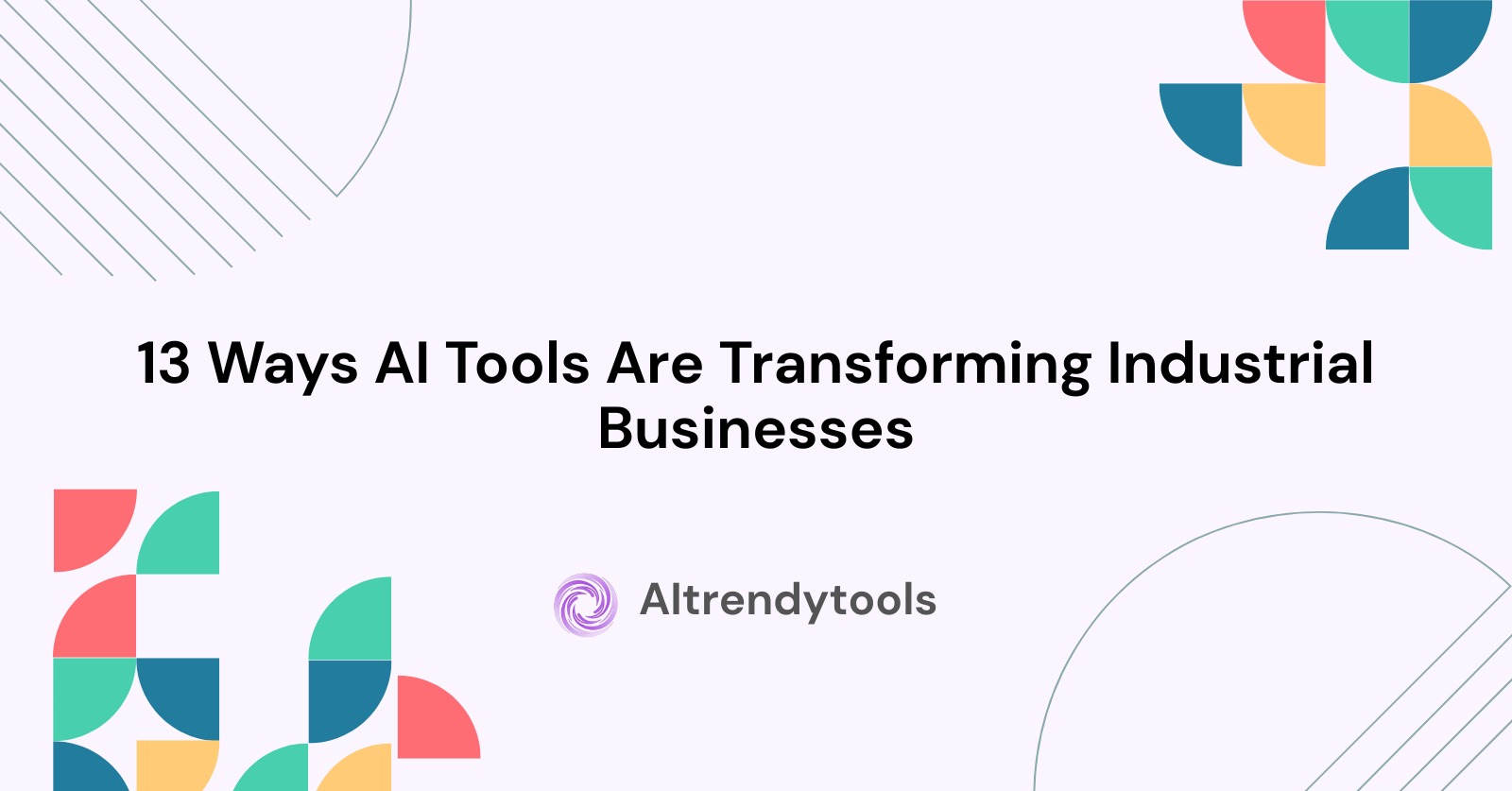🔥 AITrendytools: The Fastest-Growing AI Platform |
Write for us13 Ways AI Tools Are Transforming Industrial Businesses
AI is revolutionizing industrial businesses through predictive maintenance, automation, supply chain optimization, and smarter marketing. Discover 13 ways manufacturers and suppliers use AI tools to boost efficiency, reduce costs, and drive growth.
Dec 31, 2025
Artificial Intelligence (AI) is no longer just a buzzword — it’s a game-changer for industrial businesses. From manufacturers and logistics firms to industrial parts suppliers, AI tools are revolutionizing how operations, marketing, and customer relationships are managed. Whether you’re looking to cut costs, streamline production, or scale your outreach, AI can help you get there faster and smarter.
Here are 13 ways AI tools are helping industrial businesses stay competitive and future-ready.
1. Predictive Maintenance to Prevent Downtime
AI-driven predictive analytics can monitor machinery, identify anomalies, and predict when equipment might fail. This means maintenance happens before breakdowns occur — saving thousands in downtime costs. Tools like IBM Maximo and Siemens MindSphere are leading this space.
2. Smarter Supply Chain Management
AI can optimize every step of the supply chain — from forecasting demand to identifying bottlenecks and improving delivery routes. Machine learning models can help manufacturers predict delays and reroute shipments automatically, ensuring operations run smoothly.
3. Inventory Optimization
Industrial parts suppliers such as NRI Parts benefit hugely from AI that tracks inventory levels, sales trends, and seasonal fluctuations. Systems can automatically reorder parts when stock is low, reducing both excess inventory and stockouts — perfect for businesses managing thousands of SKUs.
4. Quality Control Through Computer Vision
AI-powered cameras can inspect parts and products in real-time, identifying defects faster and more accurately than human inspectors. This ensures consistent quality across production lines and drastically cuts waste.
5. Energy Efficiency Monitoring
AI tools can analyze energy consumption across plants and suggest optimizations. For example, they might automatically adjust machine power levels or production schedules to minimize energy costs — a big win for heavy industry and manufacturing.
6. Smarter Sales and Marketing Automation
AI isn’t just for production — it’s transforming how industrial businesses win clients.
Platforms like GoHighLevel, an all-in-one CRM and marketing automation tool, let industrial suppliers manage leads, send automated follow-ups, and even use AI-driven chatbots for customer support and there are plenty of great GoHighLevel companies out there to help.
It’s perfect for B2B companies that want to nurture long-term relationships without manually handling every message.
7. Demand Forecasting and Market Insights
AI can analyze large datasets — such as market trends, pricing history, and customer behavior — to forecast future demand. For industrial parts distributors, this means knowing what products to stock before customers even ask for them.
8. AI-Driven Design and Prototyping
Generative design tools powered by AI can create thousands of design iterations in seconds. Engineers can input constraints like material, strength, and cost, and the AI proposes optimal solutions — cutting R&D time dramatically.
9. Process Automation and Robotics
From automated packaging to robotic welding, AI-enhanced robots are making factories more efficient than ever. These systems can adapt in real-time, learning from each task to improve accuracy and productivity.
10. Data-Driven Decision Making
AI analytics platforms like Power BI or Tableau (when combined with machine learning algorithms) help industrial leaders visualize complex data and make smarter decisions. For organizations managing complex datasets across multiple sources, implementing best master data management software alongside these analytics tools ensures data consistency and accuracy. You can spot inefficiencies, identify profitable product lines, and even simulate the impact of operational changes.
11. Customer Service and Chatbots
AI chatbots now handle a majority of routine B2B inquiries — from quoting industrial parts to scheduling service calls. Integrated into CRMs like GoHighLevel, these bots can respond instantly, freeing your sales team to focus on higher-value opportunities.
12. Safety Monitoring and Risk Management
AI tools can detect potential safety hazards by monitoring sensors, cameras, or even wearable devices. They alert supervisors in real-time about unsafe conditions, helping prevent accidents and ensuring compliance with workplace regulations.
13. Enhanced Employee Training and Onboarding
AI-powered training systems use simulations and adaptive learning to onboard new staff faster. For example, technicians can practice complex maintenance tasks in virtual environments, reducing errors once they’re on the factory floor.
Final Thoughts
AI tools are revolutionizing how industrial businesses operate — from smarter machines to smarter marketing. For industrial parts businesses, AI means more efficiency, fewer errors, and faster growth. Combine that with automation platforms like GoHighLevel, and you can connect every part of your business — from operations to customer engagement — into one intelligent ecosystem.
The future of industrial business is automated, predictive, and AI-powered. Those who embrace it early won’t just survive — they’ll dominate.
🚀 Submit Your Tool to Our Comprehensive AI Tools Directory
Get your AI tool featured on our complete directory at AITrendytools and reach thousands of potential users. Select the plan that best fits your needs.





Join 30,000+ Co-Founders
Related Blogs
Maharashtra Times: Maharashtra's #1 Marathi Newspaper
Maharashtra Times (मटा) is Maharashtra's #1 Marathi newspaper since 1962. Read today's ePaper, download the free app & get live news from Mumbai, Pune & beyond.
MovieSwap: The Bold Idea to Free Every Movie Ever Made
MovieSwap wanted to let you stream any movie ever made legally. Discover why this bold Kickstarter idea failed and what it means for film fans today.
RapiCredit Review 2026: Fast Loans in Colombia?
Get cash fast with RapiCredit Colombia's top fintech lender. See real rates, requirements & honest reviews before you apply. Is it right for you in 2026?
Submit Your Tool to Our Comprehensive AI Tools Directory
List your AI tool on AItrendytools and reach a growing audience of AI users and founders. Boost visibility and showcase your innovation in a curated directory of 30,000+ AI apps.





Join 30,000+ Co-Founders

